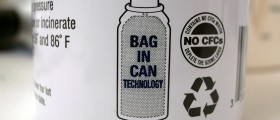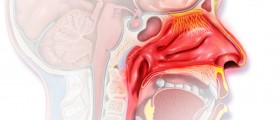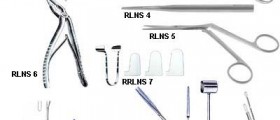
Sinus pressure is the pressure felt inside the sinuses and it is commonly accompanied by pain. The pressure occurs due to inflammation, infection, blockage and filling of the sinuses with mucus. Therefore, improper drainage of mucus leads to its accumulation and subsequent increase in sinus pressure.
The sinuses, or better known as paranasal sinuses, are air cavities inside the cranial bones. They produce mucus necessary for cleaning and moistening of the mucous membranes of the nose and throat. Each of paranasal sinuses has an opening into the nasal cavity. This opening allows proper drainage of the sinus and adequate exchange of mucus and air. In case of sinus inflammation these openings become completely blocked and mucus cannot drain. The excess of mucus inside the sinus leads to a pressure buildup. What is more, if the blockage leads to vacuum inside the sinuses the negative pressure inside the sinuses is responsible for pulling away of the membranes from the underlying structures which normally result in pain.
Causes of Sinus Pressure
In majority of cases sinus pressure is caused by an inflammation and infection of the sinuses. Sinus infection or sinusitis may be caused by different infective agents including bacteria, viruses and fungi. Even in case of colds and flu the inflammation of the nasal cavity and the throat eventually spreads onto the sinuses and leads to their inflammation and buildup of sinus pressure.
Furthermore, sinus pressure may be associated with different allergies (allergy to mold, pollen, animal dander etc.). And finally, if air is trapped inside the sinuses it always causes pain.
Symptoms of Sinus Pressure
People suffering from sinus pressure almost always complain about post nasal drip, nasal congestion accompanied by low fever and severe headache. Furthermore, there may be cold-like symptoms, stuffy nose and impaired sense of smell. Accumulation of mucus inside the sinuses may eventually cause bad breath. Depending on the affected sinus the eyelids may be swollen or a person may complain about the pain in the upper teeth. Generally, patients feel weak and tired.
How to Treat Sinus Pressure
There are several treatments which provide with relief from sinus pressure. It is a must to drain the affected sinus and maintain its drainage. Nasal decongestants may reduce swelling of the mucosa and allow mucus to drain properly. Steams and inhalers are also highly suitable for sinus drainage. People who are suffering from certain allergies are supposed to stay away from allergens and even if they are exposed to allergens they need to take prescribed medications to reduce inflammation caused by the allergic reaction. And finally, infections caused by bacteria are treated with antibiotics.

















Your thoughts on this
Loading...